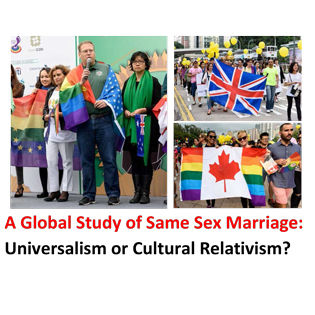A Global Study of Same Sex Marriage: Universalism or Cultural Relativism?
- Location
- Law Lecture Theatre 2
- Dates
- Monday 26 February 2018 (18:00-20:00)

According to Article 23(2) of the International Covenant on Civil and Political Rights, the right of men and women of marriageable age to marry and found a family should be recognized. Traditionally, the right to marry and found a family is reserved for heterosexual couples only. For example, this traditional view is adopted in the 2002 United Nation Communication of Joslin v New Zealand (same-sex marriage later became legal in 2013). In the UK, same-sex marriage is legalised in England, Wales and Scotland in 2014 but not Northern Ireland.
On 14 July 2011, the United Nations Human Rights Council adopted the Resolution on ‘Human Rights, Sexual Orientation and Gender Identity’ in accordance with the ‘Follow-up and implementation of the Vienna Declaration and Programme of Action’. The UNHRC Res 17/19 (aka the ‘South African Resolution’) was sponsored by South Africa and Brazil with 39 cosponsors. It received vehement opposition from 19 countries including Angola, Bahrain, Bangladesh, Cameroon, Djibouti, Gabon, Ghana, Jordan, Malaysia, Maldives, Mauritania, Nigeria, Pakistan, Qatar, Republic of Moldova, Russian Federation, Saudi Arabia, Senegal and Uganda. Three countries abstained: Burkina Faso, China and Zambia. In response to the schism between universalism and cultural relativism, a representative from one of the 19 countries commented that LGBT rights have ‘nothing to do with fundamental human rights’.
Comparing the South African case of Minister of Home Affairs v Fourie [2005] (the first country in Africa to legalise same-sex marriage), the English and Wales case of Wilkinson v Kitzinger [2006] and the recent Taiwanese case of Chi Chia-wei v Department of Civil Affairs of Taipei City [2017] (‘the first country in Asia to legalise same-sex marriage’, Guardian 24 May 2017), this paper explores the debate between universalism and cultural relativism in terms of same-sex marriage.